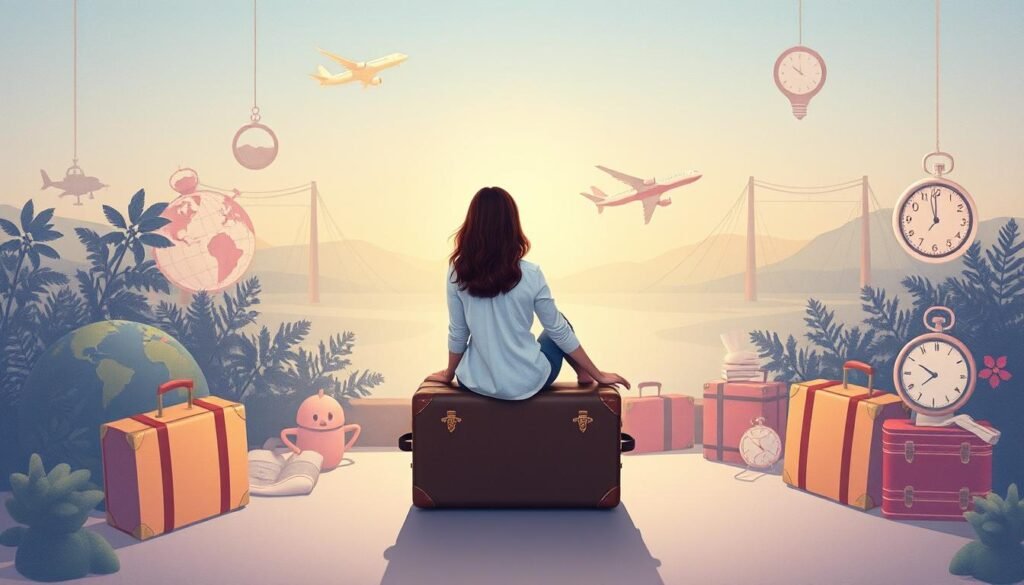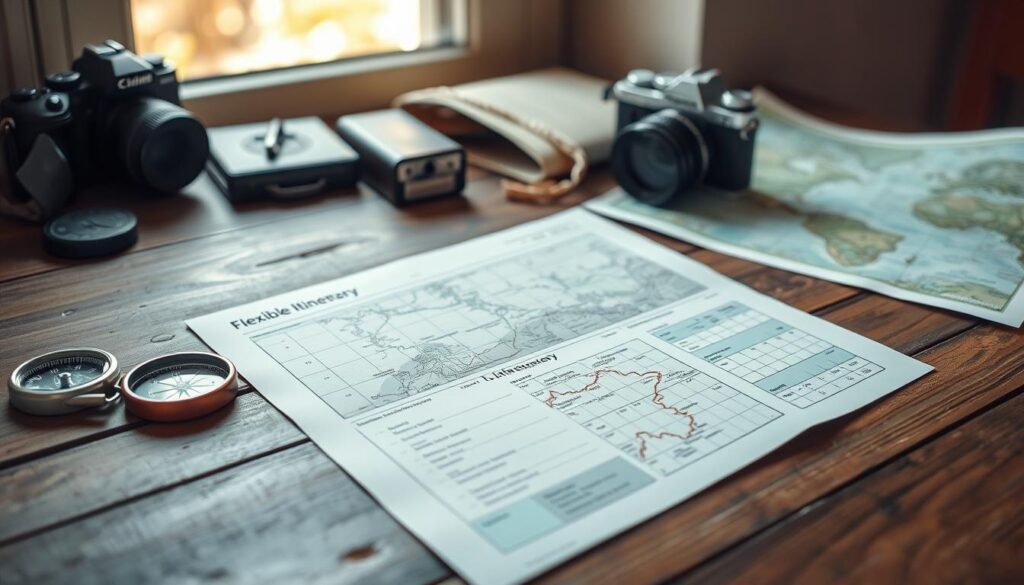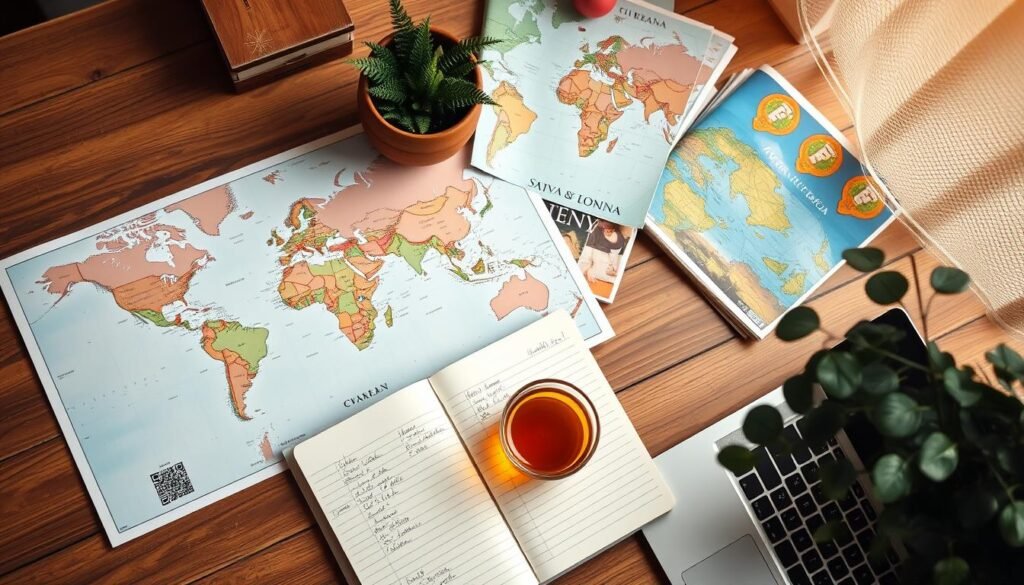About 19% of people in the U.S. have an anxiety disorder. For them, just thinking about planning a trip can be hard. In 2018, U.S. residents went on over 1.8 billion leisure trips. So, it’s important to talk about the challenges of travel anxiety. This article offers tips for anxiety-free travel. These tips are for those who are scared of traveling due to personal triggers or bad past experiences. By understanding travel anxiety and using these tips, you can turn stressful trips into fun adventures.
Key Takeaways
- Travel anxiety affects a significant percentage of the population.
- Identifying personal triggers is essential for managing anxiety while traveling.
- Developing a flexible itinerary can help reduce stress.
- Utilizing relaxation techniques and mindfulness can provide comfort during travels.
- Preparation and organization are key components for an anxiety-free trip.
Understanding Travel Anxiety
Many people feel uneasy about traveling. This can range from just a little worry to extreme fear. Knowing the symptoms of travel anxiety helps people grasp what they are going through. It also helps them find ways to deal with it.
What is Travel Anxiety?
Travel anxiety is when someone is really scared of going places. This fear can show up in different ways. It can make it hard for people to enjoy trips they were looking forward to. And it can stop them from going on unexpected adventures or enjoying new experiences.
Common Symptoms of Travel Anxiety
People feel travel anxiety in many ways. Some common signs are:
- Rapid heart rate
- Nausea or stomach problems
- Restlessness or being easily upset
- Panic attacks
- Having a hard time focusing
These issues can start just by thinking about traveling. It’s crucial for people to know what sets off their anxiety. This way, they can handle their feelings better.
Causes of Travel Anxiety
Travel anxiety has many causes, like bad travel experiences or fear of the unknown. Worrying about health away from home can also cause it. Since 18% of people in the U.S. deal with anxiety disorders, understanding these causes is important. It helps in finding ways to cope. People who feel very anxious should think about getting help from professionals. This is especially true if it’s really affecting their travel plans.
Recognizing Your Triggers
Knowing what causes your travel anxiety is key. These triggers are different for everyone, which makes each person’s experience unique. Learning about your specific triggers is the first step in dealing with travel anxiety.
Identifying Personal Anxiety Triggers
Travel anxiety is not the same for everyone. Knowing your triggers helps you find ways to cope. Some common triggers include:
- Long flights or extended travel times
- Planning detailed itineraries
- Leaving home for an extended period
- Worries about missing out on activities or experiences
Signs of anxiety might include shaking hands, shortness of breath, or a rapid heartbeat. These can come from things like flight delays or canceled plans. Identifying these triggers lets you manage your anxiety with better travel planning.
Situations That Can Exacerbate Anxiety
Certain situations can make travel anxiety worse. For instance, low blood sugar, too much caffeine, or culture shock. Anxiety can rise in situations like:
- Language barriers with locals
- Disrupted daily routines
- Lack of familiar support systems
- Overcrowded transport or places
Everyone reacts differently to these stressors. That’s why it’s important to know your triggers before you travel. With this understanding, you can create a travel plan that minimizes anxiety and makes your trip more enjoyable.

Planning a Stress-Free Trip
Planning a journey aims for fun, not stress from all the details. Start by setting goals that you can actually achieve. Having a plan that can change is key. These steps let travelers deal with surprises more easily.
Setting Realistic Expectations
Knowing that things may not go exactly as planned is vital. Accepting possible delays reduces worry. Learning about your destination’s safety and culture makes the trip safer and more fun. Planning your budget means less stress about money.
Creating a Flexible Itinerary
Being flexible means you can handle the unexpected. Plan some downtime and extra days for unexpected adventures. This approach lessens stress and adds to the fun. Keep your travel plans open. Using resources like detailed trip plans for staying and activities means a peaceful holiday.

Practical Travel Planning Tips
Traveling can be overwhelming, especially when you feel anxious. A well-planned trip helps ease this stress. By organizing your home before you leave, you lessen pre-travel nerves. Arranging your living space can make your mind clear. This makes for a better start to your travel.
Organizing Your Home Before Departure
Making your home tidy is a great tip to feel less anxious about travel. Begin with decluttering to create peace around you. This not only makes packing easier but also soothes your mind as your trip approaches. Spend time on important tasks like:
- Sorting items to keep, donate, or throw away
- Cleaning spaces to create a fresh atmosphere
- Arranging travel essentials within easy reach
Such planning makes transitioning to your trip smooth. Knowing your home is tidy gives you peace as you start your journey.
Packing Strategies for Reduced Stress
Smart packing is key to stress-free travel planning. Start packing a week early. This gives you time to think about what you need, avoiding last-minute rushes. Use:
- Packing lists to make sure you have everything
- Light packing methods to ease luggage woes, like a carry-on
- Comfortable clothes that can be worn in different ways
Don’t forget calming items like snacks, a water bottle, and charged devices. These can help during delays or surprises. Such tips make packing effective and your travel relaxing.

Building an Anti-Anxiety Toolkit
Creating an Anti-Anxiety Toolkit helps travelers handle anxiety on trips. It offers essential items and strategies for various challenges. The toolkit boosts control feelings and provides coping tools for travel-related stress.
Essential Items to Include
Adding specific items to your Anti-Anxiety Toolkit can ease travel stress. Consider these:
- Power Bank: Keeps devices charged for accessing calming apps or music.
- Mint Tea Bags: Soothes stomach stress with calming mint tea.
- Fiddle Toy: A tangible item like a stress ball helps keep the mind busy and less anxious.
- Bluetooth Eye Mask: Offers sensory isolation, helping to create a peaceful setting during long trips.
- Headphones: Reduces sensory overload and lets you listen to calming sounds or favorite tunes.
Mindfulness and Relaxation Techniques
Using Mindfulness Techniques daily increases calmness and readiness when traveling. Deep breathing and short meditations offer quick anxiety relief. Viewing anxiety as a chance to learn fosters a forward-thinking attitude toward stress.
Journaling at night can even emotions and boost serotonin. A simple routine focusing on positive thoughts versus anxious ones brings mental balance. Tools from the Anti-Anxiety Toolkit are great for daily anxiety management.
Making Peace with the Worst-Case Scenario
Travel can make us anxious, especially with thoughts of Medical Concerns and unexpected events. Recognizing possible tough situations, like getting sick while away or money worries, helps us face our fears. This approach gives us power.
Addressing Medical Concerns
Being prepared is key to easing worries about health before a trip. It’s important to bring a health kit with things like a thermometer and children’s Tylenol. Getting travel insurance in advance is smart. It covers us if medical emergencies happen. This plan helps to lower stress a lot.
Financial Preparation for Unexpected Events
Making financial plans is crucial for a good trip. Knowing about cancellation policies and planning for possible costs reduces worries. It’s wise to save some money just for emergency uses. Watching flight and hotel prices helps keep surprises at bay. Fear of spending unplanned money can make us anxious, so having a clear budget is calming. This budget is key for Financial Preparation.
Seeing challenges as chances to learn can change anxiety into something we can handle when traveling. Planning should make us feel free, not trapped. This lowers stress about things going wrong. Keeping lists, both digital and in our minds, also helps.
To manage travel anxiety better, look into mindful methods and support groups. They make journeys more enjoyable. For advice on staying calm when traveling, check out this link.
Utilizing Support Systems
When you plan a trip, choosing the right support can make a big difference for anyone dealing with anxiety. It’s great to have friends or family along for the ride. They can offer support and comfort. It’s key to talk about any anxiety with people you trust. Checking in with them often during the trip helps you feel connected. This reduces loneliness and boosts your mood.
Traveling with others can make tough situations easier to handle. They help with everything, from booking hotels to finding fun things to do. This can make stress seem smaller and help you become stronger. Research shows that having friends around helps you deal better with stress.
Choosing to travel in a group can add more support. Having good friends around can make you happier. So, when planning an adventure, think about being with people who lift your spirits. This can lead to more fun, less worry, and better handling of anxiety during your trip.
- Openly discuss travel concerns with companions.
- Request check-ins during the trip for added reassurance.
- Participate actively in group activities to cultivate relationships.
- Express gratitude toward friends and loved ones for their support.
Keeping up with these friendships can ease travel stress and help your mental health over time. Meeting up often is especially good. It releases hormones that calm you down and fights stress. Enjoy being with your friends and family while traveling. This makes the trip better. Plus, it helps you grow as a person. Learning how to manage anxiety through travel is valuable. For more info, check out anxiety management.
Distraction Techniques During Travel
Travel brings excitement, but sometimes it brings anxiety too. Effective distraction techniques can help manage this anxiety. Doing things you enjoy can change the game, helping you focus on now instead of worry.
Engaging Activities for Mindfulness
Incorporating mindfulness activities is a great way to handle travel anxiety. Simple activities like reading a good book or watching a favorite movie can help. They shift your focus and relax you.
Listening to music is another great tool. Making a travel playlist can bring comfort on long trips. Practices like guided meditations or journaling also promote mindfulness. They help you stay in the moment, making the trip better.
Travel Companions and Their Benefits
Traveling with others can make your trip better. When you’re feeling anxious, having supportive friends or family can turn stress into fun adventures. Doing fun things together can make you feel less alone.
Laughter and making memories can make anxious thoughts go away. Learning about how travel companions help can show how they buffer stress. And they make the journey enjoyable. For managing travel anxiety tips, including distractions, check this article for help.
Conclusion
Traveling with anxiety doesn’t have to be hard. By understanding your feelings and knowing what triggers your anxiety, you can make your trip enjoyable. Planning your journey can become exciting instead of stressful. With the right approach, you can travel confidently and smoothly.
Starting to plan your vacation early helps make the trip stress-free. It’s smart to think about your budget, plan carefully, and set goals you can achieve. Being prepared reduces worry before your trip and lets you enjoy unexpected moments while traveling.
To truly enjoy traveling, it’s important to stay positive and use smart tips. Good planning changes travel from something scary to an exciting chance to grow, have fun, and create lasting memories.